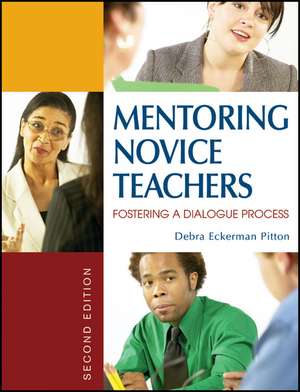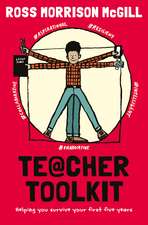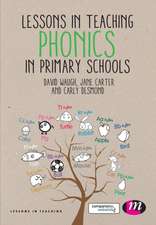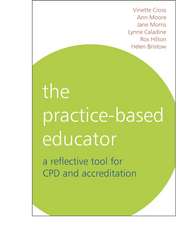Mentoring Novice Teachers: Fostering a Dialogue Process
Autor Debra Eckerman Pittonen Limba Engleză Paperback – 7 iun 2006
Mentoring Novice Teachers: Fostering a Dialogue Process focuses on building the knowledge, skills, and competencies mentors need in order to effectively support and guide new teachers. The book examines roles in mentoring relationships, presents strategies that foster trust and open communication, and offers practical ideas for addressing the specific needs of novice teachers. Reflections, discussion prompts, and role-plays are incorporated throughout the book to increase the mentor's awareness and promote positive and effective interactions between mentors and beginning teachers.
Enhancements to the second edition include:
o A facilitator's guide that outlines how to use this book in mentor training
o Expanded coverage of mentoring strategies and processes
o Updated research about effective mentoring and communication
o A stronger focus on the implications of mentoring individuals with diverse backgrounds and experiences
This unique resource blends theory and practice in a format that meets the needs of mentors and facilitates a powerful means of support for novice teachers.
Preț: 296.45 lei
Nou
Puncte Express: 445
Preț estimativ în valută:
56.73€ • 59.38$ • 47.21£
56.73€ • 59.38$ • 47.21£
Carte tipărită la comandă
Livrare economică 31 martie-14 aprilie
Preluare comenzi: 021 569.72.76
Specificații
ISBN-13: 9781412936712
ISBN-10: 1412936713
Pagini: 184
Dimensiuni: 216 x 279 x 15 mm
Greutate: 0.45 kg
Ediția:Second Edition
Editura: SAGE Publications
Colecția Corwin
Locul publicării:Thousand Oaks, United States
ISBN-10: 1412936713
Pagini: 184
Dimensiuni: 216 x 279 x 15 mm
Greutate: 0.45 kg
Ediția:Second Edition
Editura: SAGE Publications
Colecția Corwin
Locul publicării:Thousand Oaks, United States
Recenzii
"Thorough, comprehensive, and well thought-out. The author provides an important addition to the growing number of publications about mentoring, focusing on the content of mentor training and development. I like the way content is conveyed in a constructivist mode through the means of group dialogue, while at the same time allowing for individual reflection."
"This practical and comprehensive guide to the complex work of new teacher mentoring is a real contribution to the field."
"This practical and comprehensive guide to the complex work of new teacher mentoring is a real contribution to the field."
Cuprins
Preface
Acknowledgments
About the Author
1. Defining the Mentoring Relationship
What Is a Mentor?
Why We Need Mentors
Why We Need Mentor Training
Why Be a Mentor?
A Personal Vision of Teaching
Roles in Mentoring
2. The Heart of Mentoring: Trust and Open Communication
Building Trust
Open Communication
Building a Mentoring Relationship With an Experienced Colleague
3. Understanding the Needs of the Novice Teacher
Dealing With a Range of Needs
4. Addressing the Novice Teacher’s Specific Needs
The Need for an Action Plan and Resources
The Need for Honesty
What Student Teachers Need
5. The Mentor’s Lens
Viewing Teaching and Learning Through a Lens
6. The Conferencing Cycle
The Pre-Observation Conference
The Observation
The Post-Observation Conference
7. Data-Gathering Techniques and Tools
Qualitative Versus Quantitative Data
Scripting
Proximity Analysis
Verbal Flow
Numeric Data
Video- and Audiotaping
8. Evaluating the Mentoring Experience
Program Evaluation
Evaluation for Personal Growth: Mentors
Evaluation for Personal Growth: The Novice Teacher
Resource A: Mentoring Projects
Project: Novice Teacher Resource Book
Project: Formative Action Plan
Project: Sharing Your Expertise
Project: Reflections
Project: E-Mentoring and Electronic Discussions
Resource B: Role-Plays
Scenarios
Additional Mentor/Mentee Situations
Resource C: How to Use This Text: A Guide for Individuals and Facilitators
Facilitator's Guide to Setting Up a Workshop
Workshop Sessions
Resource D: Web Sites for Mentors
Bibliography
Index
Acknowledgments
About the Author
1. Defining the Mentoring Relationship
What Is a Mentor?
Why We Need Mentors
Why We Need Mentor Training
Why Be a Mentor?
A Personal Vision of Teaching
Roles in Mentoring
2. The Heart of Mentoring: Trust and Open Communication
Building Trust
Open Communication
Building a Mentoring Relationship With an Experienced Colleague
3. Understanding the Needs of the Novice Teacher
Dealing With a Range of Needs
4. Addressing the Novice Teacher’s Specific Needs
The Need for an Action Plan and Resources
The Need for Honesty
What Student Teachers Need
5. The Mentor’s Lens
Viewing Teaching and Learning Through a Lens
6. The Conferencing Cycle
The Pre-Observation Conference
The Observation
The Post-Observation Conference
7. Data-Gathering Techniques and Tools
Qualitative Versus Quantitative Data
Scripting
Proximity Analysis
Verbal Flow
Numeric Data
Video- and Audiotaping
8. Evaluating the Mentoring Experience
Program Evaluation
Evaluation for Personal Growth: Mentors
Evaluation for Personal Growth: The Novice Teacher
Resource A: Mentoring Projects
Project: Novice Teacher Resource Book
Project: Formative Action Plan
Project: Sharing Your Expertise
Project: Reflections
Project: E-Mentoring and Electronic Discussions
Resource B: Role-Plays
Scenarios
Additional Mentor/Mentee Situations
Resource C: How to Use This Text: A Guide for Individuals and Facilitators
Facilitator's Guide to Setting Up a Workshop
Workshop Sessions
Resource D: Web Sites for Mentors
Bibliography
Index
Notă biografică
Debra Eckerman Pitton is an Associate Professor of Education at Gustavus Adolphus College in St. Peter, MN, where she teaches middle school and secondary methods courses, and supervises student teachers. In addition, she conducts mentor training workshops for school districts across the country, and regularly presents at conferences. She has taught language arts at the middle school and high school levels, and interpersonal and group communication at the community college level. She has also served as assistant superintendent for curriculum and learning.
Descriere
This updated resource helps mentors develop skills for guiding new teachers and offers reflections, discussion prompts, and role plays to promote effective interactions between mentors and beginning teachers.













